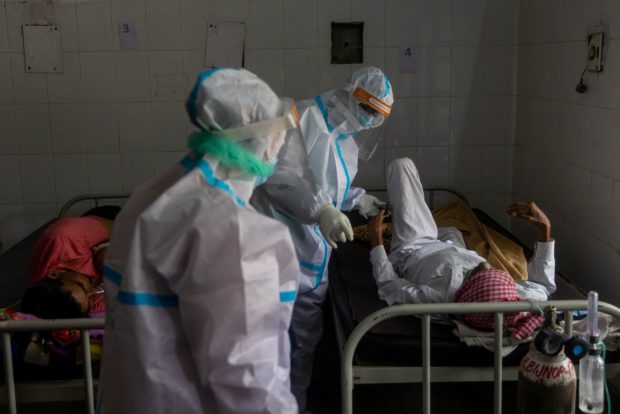India COVID-19 variant exhibits resistance; antibody drug shows promise

FILE PHOTO: Medics tend to a man with breathing problems inside a COVID-19 ward of a government-run hospital, amidst the coronavirus disease (COVID-19) pandemic, in Bijnor district, Uttar Pradesh, India, May 11, 2021. REUTERS/Danish Siddiqui
Antibody drugs and COVID-19 vaccines are less effective against a coronavirus variant that was first detected in India, according to researchers.
The variant, known as B.1.617.2, has mutations that make it more transmissible. It is now predominant in some parts of India and has spread to many other countries.
A multicenter team of scientists in France studied a B.1.617.2 variant isolated from a traveler returning from India. Compared to the B.1.1.7 variant first identified in Britain, the India variant was more resistant to antibody drugs, although three currently approved drugs still remained effective against it, they found.
Antibodies in blood from unvaccinated COVID-19 survivors and from people who received both doses of the Pfizer/BioNTech vaccine were 3-fold to 6-fold less potent against the India variant than against the UK variant and a variant first identified in South Africa, according to a report posted on Thursday on the website bioRxiv ahead of peer review.
The two-dose AstraZeneca vaccine, which does not protect against the South Africa variant, is likely to be ineffective against the India variant as well.
Article continues after this advertisementAntibodies from people who had received their first dose “barely inhibited” this India variant, said study co-author Olivier Schwartz of Institut Pasteur. The study, Schwartz added, shows that the rapid spread of the India variant is associated with its ability to “escape” the effect of neutralizing antibodies.
Article continues after this advertisementMeanwhile, an antibody drug from Vir Biotechnology and GlaxoSmithKline that protects against progression of COVID-19 in high-risk patients with mild to moderate disease received emergency use authorization by the U.S. Food and Drug Administration on Wednesday.
In a large randomized trial, patient risk of progression to more severe illness was reduced by 85% with the drug, sotrovimab, compared to a placebo, according to an interim report from the trial posted on Friday on the medRxiv website in advance of peer review.
Everyone in the trial had risk factors for severe COVID-19 such as heart disease, diabetes, obesity, and old age.
Three of 291 patients (1%) in the sotrovimab group became sick enough to be hospitalized, versus 21 of 292 (7%) in the placebo group, researchers said. All five patients who needed to be admitted to intensive care received placebo, they reported.
Serious complications were less common with sotrovimab than with placebo, they added.
The antibody treatment will be available for COVID-19 patients in the coming weeks, GSK and Vir said on Wednesday.
For more news about the novel coronavirus click here.
What you need to know about Coronavirus.
For more information on COVID-19, call the DOH Hotline: (02) 86517800 local 1149/1150.
The Inquirer Foundation supports our healthcare frontliners and is still accepting cash donations to be deposited at Banco de Oro (BDO) current account #007960018860 or donate through PayMaya using this link.